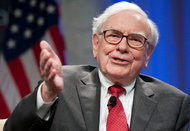 Cliff Owen/Associated PressWarren E. Buffett, chairman and chief executive of Berkshire Hathaway.
Cliff Owen/Associated PressWarren E. Buffett, chairman and chief executive of Berkshire Hathaway.
Berkshire Hathaway has agreed to buy the 20 percent of the IMC International Metalworking Companies that it does not already own for $2.05 billion, giving it full control of the company.
The deal was announced on Wednesday, just days before Berkshire holds its annual shareholder meeting, where Warren E. Buffett is expected to tell investors that he remains on the hunt for big deals.
It is the second big acquisition by Mr. Buffett’s company this year, following the blockbuster $23 billion takeover of H.J. Heinz by Berkshire and 3G Capital.
By buying the rest of IMC, an Israeli tool maker, from its founding Wertheimer family, Mr. Buffett is completing an acquisition that he began seven years ago. Berkshire’s initial purchase of an 80 percent stake for $5 billion was one of the largest takeovers of an Israeli company in that country’s history.
In a statement, Mr. Buffett attributed the 64 percent rise in IMC’s valuation over the seven years to the tool maker’s enormous growth.
“Since the time IMC entered our lives, my partner, Charlie Munger, and I have enjoyed Berkshire’s association with the company, the Wertheimer family, and the company’s management team,” Mr. Buffett said in a statement. “We look forward to continuing our stewardship of this unique company founded by the Wertheimer family in Israel 60 years ago and nurtured into a truly global enterprise.”
Berkshire was advised by its usual law firm, Munger, Tolles Olson. The Wertheimers were counseled by Wachtell, Lipton, Rosen Katz.
Article source: http://dealbook.nytimes.com/2013/05/01/berkshire-to-buy-rest-of-imc-for-2-billion/?partner=rss&emc=rss



